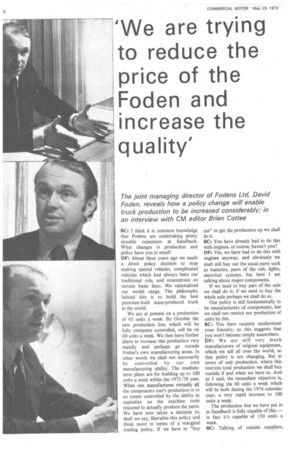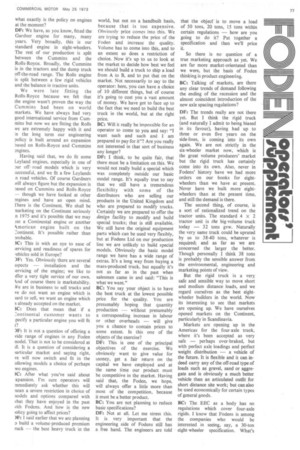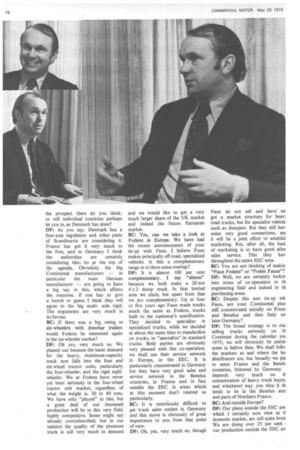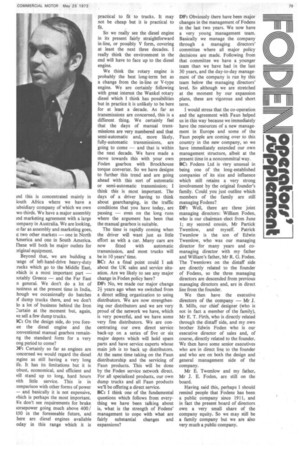'We are trying to reduce the price of the Foden and increase the
Page 78

Page 79

Page 80

Page 81

If you've noticed an error in this article please click here to report it so we can fix it.
The joint managing director of Fodens Ltd, David Foden, reveals how a policy change will enable truck production to be increased considerably; in an interview with CM editor Brian Cottee
BC: I think it is common knowledge that Fodens are undertaking pretty sizeable expansion at Sandbach. What changes in production and policy have you in mind?
DF: About three years ago we made a direct policy decision to stop making special vehicles, complicated vehicles which had always been our traditional role, and concentrate on certain basic lines. We rationalized our model range. The philosophy behind this is to build the best premium-built mass-produced truck in the world.
We are at present on a production of 45 units a week. By October the new production line, which will be fully computer controlled, will be on 60 units a week. We then have further plans to increase this production very rapidly and perhaps go outside Foden's own manufacturing areas. In other words we shall not necessarily be controlled by our own manufacturing ability. The mediumterm plans are for building up to 100 units a week within the 1975 /76 year. When one manufactures virtually all the components one's production is to an extent controlled by the ability to capitalize on the machine tools required to actually produce the parts. We have now taken a decision to, shall we say, liberalize this policy and think more in terms of a marginal trading policy. If we have to "buy Out" to get the production up we shall do it.
BC: You have already had to do this with engines, of course, haven't you? DF: Yes, we have had to do this with engines anyway, and obviously we shall still buy out the usual parts such as batteries, parts of the cab, lights, electrical systems, but here I am talking about major components.
If we need to buy part of the axle we shall do it; if we need to buy the whole axle perhaps we shall do so.
Our policy is still fundamentally to he manufacturers of components, but we shall not restrict our production of units by this.
BC: You have recently modernized your foundry, so this suggests that you won't become simply assemblers. DP: We are still very much manufacturers of original equipment, which we sell all over the world, so that policy is not changing. But in terms of unit production, where this restricts total production we shall buy outside if and when we have to. And as I said, the immediate objective is, following the 60 units a week which will be built during the 1974 calendar year, a very rapid increase to 100 units a week.
The production line we have put in at Sandbach is fully capable of this — in fact it's capable of 150 units a week.
BC: Talking of outside suppliers, what exactly is the policy on engines at the moment?
DF: We have, as you know, fitted the Gardner engine for many, many years. Very broadly, this is our standard engine in eight-wheelers.
The rest of our production is split between the Cummins and the Rolls-Royce. Broadly, the Cummins is in the tractors and the dump truck off-the-road range. The Rolls engine is split between a few rigid vehicles and the balance in tractive units.
We were late fitting the Rolls-Royce because we felt that the engine wasn't proven the way the Cummins had been on world markets. We have always had very good international service from Cum mins but now we are fitting the Rolls we are extremely happy with it and in the long term our engineering policy is built around an expansion nased on Rolls-Royce and Cummins :ngines.
Having said that, we do fit some Leyland engines, especially in one of )ur offroad models which is very niccessful, and we fit a few Leylands n road vehicles. Of course Gardners will always figure but the expansion is 3ased on Cummins and Rolls-Royce — though we have looked at other mgines and have an open mind.
fhere is the Continent. We shall be narketing on the Continent seriously
n 1975 and it's possible that we may 3se a Continental engine or another kmerican engine built on the .7ontinent. It's possible rather than )robable.
3C: This is with an eye to ease of ;ervicing and readiness of spares for vehicles sold in Europe?
3F: Yes. Obviously there are several ispects — installation and the
ervicing of the engine; we like to )ffer a very tight service of our own. knd of course there is marketability.
We are in business to sell trucks and ve do not want an engine which is lard to sell, we want an engine which s already accepted on the market.
IC: Does that mean that if a :ontinental customer wants to pecify a particular engine you will fit t?
3F: It is not a question of offering a vide range of engines in any Foden
node!. That is not to be considered at ill. It is a question of considering a particular market and saying right, ye will now switch and fit in the ollowing models a choice of perhaps we engines.
IC: After what you've said about xpansion. I'm sure operators will
mmediately ask whether this will nean a severe restriction in choice of aodels and options compared with that they have enjoyed in the past vith Fodens. And how is the new lolicy going to affect prices?
W: I said earlier that we are planning D build a volume-produced premium ruck — the best heavy truck in the
world, but not on a handbuilt basis, because that is too expensive. Obviously price comes into this. We are trying to reduce the price of the Foden and increase the quality. Volume has to come into this, and to an extent so does a restriction of choice. Now it's up to us to look at the market to decide how best we feel we should build a truck to ship a load from A to B, and to put that on the market. Not necessarily to say to the operator: here, you can have a choice of 10 different things, but of course it's going to cost you a vast amount of money. We have got to face up to the fact that we need to build the best truck in the world, but at the right price.
BC: Will it really be impossible for an operator to come to you and say: "I want such and such and I am prepared to pay for it"? Are you really not interested in that sort of business any longer?
DF: I think, to be quite fair, that there must be a limitation on this. We would not really build a special which was completely outside our basic model range. It's equally true to say that we still have a tremendous flexibility with some of the distributors who are selling our products in the United Kingdom and who are prepared to modify trucks. Certainly we are prepared to offer the design facility to modify and build special trucks; that is still available. We still have the original equipment parts which can be used very flexibly, but at Fodens Ltd On our production line we are unlikely to build special models. Obviously the basic model range we have has a wide range of extras. It's a long way from buying a mass-produced truck, but equally it's not as far as in the past when salesmen came in and said: "This is what we want."
BC: You say your object is to have the best truck at the lowest possible price for the quality. You are presumably hoping that quantity production — without presumably a corresponding increase in labour or other overheads — will give you a chance to contain prices to some extent. Is this one of the objects of the exercise?
DF: This is one of the principal objectives of the exercise. We obviously want to give value for money, get a fair return on the capital we have employed and at the same time our product must be competitive in the market. Having said that, the Foden, we hope, will always offer a little more than most of the competition, because it must be a better product.
BC: You are not planning to reduce basic specifications?
DF: Not at all. Let me stress this. It is very important that the engineering side of Fodens still has a free hand. The engineers are told
that the object is to move a load of 50 tons, 20 tons, 15 tons within certain regulations — how are you going to do it? Put together a specification and then we'll price it.
So there is no question of a true marketing approach as yet. We are far more market-orientated than we were, but the basis of Foden thinking is product engineering.
BC: Talking of markets, are there any clear trends of demand following the ending of the recession and the almost coincident introduction of the new axle spacing regulations?
DF: The trends really are not there yet. But I think the rigid truck (and naturally I admit to being biased in its favour), having had up to three or even five years on the side-lines, is coming into its own again. We are not strictly in the six-wheeler market now, which is the great volume producers' market but the rigid truck has certainly come into its own. Also, never in Fodens' history have we had more orders on our books for eightwheelers than we have at present. Never have we built more eightwheelers than at the present time, and still the demand is there.
The second thing, of course, is a sort of rationalized trend on the tractor units. The standard 4 x 2 tractor unit is the big-volume truck today — 32 tons gvw. Naturally the very same truck could be uprated by us to 38-40 tons, whatever is required; and as far as we are concerned the larger the better. Though personally I think 38 tons is probably the sensible answer from the environmental, engineering and marketing points of view.
But the rigid truck is a very safe and sensible way to move short and medium distance loads, and we regard ourselves as the best eightwheeler builders in the world. Now its interesting to see that markets are opening up. We have ourselves opened markets on the Continent, particularly in Scandinavia.
Markets are opening up in the Americas for the four-axle truck, where it's been accepted as very safe — perhaps over-braked, but with perfect axle loadings and perfect weight distribution — a vehicle of the future. It is flexible and it can indeed carry any of the off-road type of loads such as gravel, sand or aggregate and is obviously a much better vehicle than an articulated outfit for short distance site work; but can also be used economically for certain types of general goods.
BC: The EEC as a body has no regulations which cover four-axle rigids. I know that Fodens is among the companies who would be interested in seeing, say, a 30-ton eight-wheeler specification. What's
the prospect there do you think; or will individual countries perhaps let you in, as Denmark has done?
DF: As you say, Denmark has a four-axle regulation and other parts of Scandinavia are considering it. France has got it very much to the fore, and in Germany I think
the authorities are certainly considering this; its at the top of the agenda. Obvier6sly the big Continental manufacturers — in particular the main German manufacturer — are going to have a big say in this, which affects the outcome. If one has to give a hunch or guess I think they will agree to the big multiaxle rigid. The arguments are very much in its favour.
BC: If there was a big swing to six-wheelers with drawbar trailers would Fodens be interested again in the six-wheeler market?
DF: Oh yes, very much so. We phased out because the basic demand for the heavy, maximum-capacity truck now falls into the four and six-wheel tractor units, particularly the four-wheeler, and the rigid eightwheeler. We at Fodens have never yet been seriously in the four-wheel tractor unit market, regardless of what the weight is, 30 to 40 tons. We have only "played" at this, but a great deal of our increased production will be in this very field, highly competitive. Some might say already oversubscribed, but in our opinion the quality of the premium truck is still very much in demand
and we would like to get a very much larger share of the UK market and indeed the future European market.
BC: Yes, can we take a look at Fodens in Europe. We have had the recent announcement of your tie-up with Faun. I believe Faun makes principally off-road, specialized vehicles. Is this a complementary range or is there some overlap?
DF: It is almost 100 per cent complementary. I say "almost" because we both make a 20-ton 4X2 dump truck. In that limited area we clash, but apart from that we are complementary. Up to four or five years ago Faun made trucks much the same as Fodens, trucks built to the customer's specification. They decided to specialize in specialized trucks, while we decided at about the same time to standardize on trucks, to "specialize" in standard trucks. Both parties are obviously very pleased with this co-operation. we shall use their service network in Europe, in the EEC. It is particularly concentrated in Germany but they have very good sales and service network in the Benelux countries, in France and in fact outside the EEC in areas which at this moment don't interest us particularly.
BC: It is notoriously difficult to get truck sales outlets in Germany and this move is obviously of great importance to you from that point of view.
DF: Oh, yes, very much so, though
Faun do not sell and have no got a market structure for hear road trucks, but for specialist vehicle such as dumpers. But they still hay some very good connections, an it will be a joint effort to establisl marketing. But, after all, the basi of marketing is to have good after sales service. This they hay throughout the entire EEC area.
BC: You are not thinking of makin "Faun Fodens" or "Foden Fauns"?
DF: Well, we are certainly lookin into areas of co-operation in th engineering field and indeed in th purchasing areas.
BC: Despite this new tie-up wit Faun, are your Continental plan
still concentrated initially on Franc and Benelux and then Italy an later Germany?
DF: The broad strategy is to sta] selling trucks seriously on Continent during the calendar ye
1975; we will obviously be puttin some in before then. We shall fobo the markets as and where the be distributors are, but broadly we pla to enter France and the Benet': countries, followed by Germany.
depends very much on ti concentration of heavy truck buyin and whichever way you slice it th tends to be in the Benelux are and parts of Northern France.
BC: And outside Europe?
DF: Our plans outside the EEC are which I certainly now view as tl domestic market, are still quite broa We are doing over 25 per cent our production outside the EEC an
tnd this is concentrated mainly in iouth Africa where we have a ;ubsidiary company of which we own wo thirds. We have a major assembly Ind marketing agreement with a large :company in Australia. We are looking, 0 far as assembly and marketing goes, it two other markets — one in North 4.merica and one in South America. These will both be major outlets for miginal equipment.
Beyond that, we are building a -ange of left-hand-drive heavy-duty rucks which go to the Middle East, which is a most important part — lotably Greece — and the Far East n general. We don't do a lot of )usiness at the present time in India, hough we occasionally do batches )f dump trucks there, and we don't Jo a lot of business behind the Iron Zurtain at the moment but, again, ve sell a few dump trucks.
3C: On the design side, do you forewe the diesel engine and the ;onventional manual gearbox remainng the standard form for a very ong period to come?
3F: Certainly so far as engines are :oncerned we would regard the diesel :nine as still having a very long ife. It has its limitations but it is .obust, economical, and efficient and viii stand up to long, hard hours vith little service. This is in :comparison with other forms of power — and basically it is not expensive, vhich is perhaps the most important. We don't see requirements for brake torsepower going much above 400/ 450 in the foreseeable future, and here are diesel engines available oday in this range which it is practical to fit to trucks. It may not be cheap but it is practical to fit.
So we really see the diesel engine in its present fairly straightforward in-line, or possibly V form, covering at least the next three decades. I really think the environment in the end will have to face up to the diesel engine.
We think the rotary engine is probably the best long-term bet as a change from the in-line or V-type engine. We are certainly following with great interest the Wankel rotary diesel which I think has possibilities but in practice it is unlikely to be here for at least a decade. As far as transmissions are concerned, this is a different thing. We certainly feel that the days of manual transmissions are very numbered and that semi-automatic and, more likely, fully-automatic transmissions, are going to come — and that is within the next decade. We have made a move towards this with your own Foden gearbox with Brockhouse torque converter. So we have designs to further this trend and are going ahead with this sort of automatic or semi-automatic transmission; I think this is most important. The days of a driver having to think about gearchanging, in the traffic conditions that you have today, are passing — even on the long runs where the argument has been that the manual gearbox is suitable.
The time is rapidly coming when the driver will want just as little effort as with a car. Many cars are now fitted with automatic transmission, and most trucks will be in 10 years' time.
BC: As a final point could I ask about the UK sales and service situation. Are we likely to see any major change in Foden policy here?
DF: No, we made our major change 2+ years ago when we switched from a direct selling organization to using distributors. We are now strengthening our distributors and we are very proud of the network we have, which is very powerful, and we have some very fine distributors. We are concentrating our own direct service back-up on a series of five or six major depots which will hold spare parts and have service experts whose main job is to back up distributors. At the same time taking on the Faun distributorship and the servicing of Faun products. This will be done by the Foden service network direct. For all specialized products, our own dump trucks and all Faun products we'll be offering a direct service.
BC: I think one of the fundamental questions which follows from everything we have been talking about is, what is the strength of Fodens' management to cope with what are fairly substantial changes and expansions? DF: Obviously there have been major changes in the management of Fodens in the last two years. We now have a very young management team. Basically we manage the company through a managing directors' committee where all major policy decisions are made. Following from that committee we have a younger team than we have had in the last 30 years, and the day-to-day management of the company is run by this team below the managing directors' level. So although we are stretched at the moment by our expansion plans, these are vigorous and short term.
I would stress that the co-operation and the' agreement with Faun helped us in this way because we immediately have the resources of a new management in Europe and some of the Faun people are coming over to this country in the new company, so we have immediately extended our own management structure, albeit at the present time in a noncommittal way. BC: Fodens Ltd is very unusual in being one of the long-established companies of its size and influence which still retains a very strong involvement by the original founder's family. Could you just outline which members of the family are still managing Fodens?
DF: Well, there are three joint managing directors: William Foden, who is our chairman elect from June 1; my second cousin, Mr Partick Twemlow, and myself. Patrick Twemlow is the son of Edwin Twemlow, who was our managing director for many years and comanaging director with my father and William's father, Mr R. G. Foden. The Twemlows on the distaff side are directly related to the founder of Fodens, so the three managing directors are descended from previous managing directors and, are in direct line from the founder.
We then have the executive directors of the company — Mr J. B. Mills, our chief designer (who is not in fact a member of the family), Mr E. T. Firth, who is directly related through the distaff side, and my own brother Edwin Foden who is our executive director of sales and, of course, directly related to the founder. We then have some senior executives who are in direct line to the founder and who are on both the design and general management side of the company.
Mr E. Twemlow and my father, Mr J. E. Foden, are still on the board.
Having said this, perhaps I should remind people that Fodens has been a public company since 1911, and in fact the present board of directors own a very small share of the company equity. So we may still be a family company but we are also very much a public company.
























































































































































